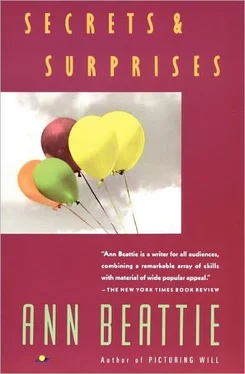Ann Beattie
Secrets & Surprises
Nick and Karen had driven from Virginia to New York in a little under six hours. They had made good time, keeping ahead of the rain all the way, and it was only now, while they were in the restaurant, that the rain began. It had been a nice summer weekend in the country with their friends Stephanie and Sammy, but all the time he was there Nick had worried that Karen had consented to go with him only out of pity; she had been dating another man, and when Nick suggested the weekend she had been reluctant. When she said she would go, he decided that she had given in for old time’s sake.
The car they drove was hers — a white Thunderbird convertible. Every time he drove the car, he admired it more. She owned many things that he admired: a squirrel coat with a black taffeta lining, a pair of carved soapstone bookends that held some books of poetry on her night table, her collection of Louis Armstrong 78s. He loved to go to her apartment and look at her things. He was excited by them, the way he had been spellbound, as a child, exploring the playrooms of schoolmates.
He had met Karen several years before, soon after he came to New York. Her brother had lived in the same building he lived in then, and the three of them met on the volleyball courts adjacent to the building. Her brother moved across town within a few months, but by then Nick knew Karen’s telephone number. At her suggestion, they had started running in Central Park on Sundays. It was something he looked forward to all week. When they left the park, his elation was always mixed with a little embarrassment over his panting and his being sweaty on the street, but she had no self-consciousness. She didn’t care if her shirt stuck to her body, or if she looked unattractive with her wet, matted hair. Or perhaps she knew that she never looked really unattractive; men always looked at her. One time, on Forty-second Street, during a light rain, Nick stopped to read a movie marquee, and when he turned back to Karen she was laughing and protesting that she couldn’t take the umbrella that a man was offering her. It was only when Nick came to her side that the man stopped insisting — a nicely dressed man who was only offering her his big black umbrella, and not trying to pick her up. Things like this were hard for Nick to accept, but Karen was not flirtatious, and he could see that it was not her fault that men looked at her and made gestures.
It became a routine that on Sundays they jogged or went to a basketball court. One time, when she got frustrated because she hadn’t been able to do a simple hook shot — hadn’t made a basket that way all morning — he lifted her to his shoulders and charged the backboard so fast that she almost missed the basket from there too. After playing basketball, they would go to her apartment and she would make dinner. He would collapse, but she was full of energy and she would poke fun at him while she studied a cookbook, staring at it until she knew enough of a recipe to begin preparing the food. His two cookbooks were dog-eared and sauce-stained, but Karen’s were perfectly clean. She looked at recipes, but never followed them exactly. He admired this — her creativity, her energy. It took him a long while to accept that she thought he was special, and later, when she began to date other men, it took him a long while to realize that she did not mean to shut him out of her life. The first time she went away with a man for the weekend — about a year after he first met her — she stopped by his apartment on her way to Pennsylvania and gave him the keys to her Thunderbird. She left so quickly — the man was downstairs in his car, waiting — that as he watched her go he could feel the warmth of the keys from her hand.
Just recently Nick had met the man she was dating now: a gaunt psychology professor, with a black-and-white tweed cap and a thick mustache that made him look like a sad-mouthed clown. Nick had gone to her apartment not knowing for certain that the man would be there — actually, it was Friday night, the beginning of the weekend, and he had gone on the hunch that he finally would meet him — and had drunk a vodka Collins that the man mixed for him. He remembered that the man had complained tediously that Paul McCartney had stolen words from Thomas Dekker for a song on the “Abbey Road” album, and that the man said he got hives from eating shellfish.
In the restaurant now, Nick looked across the table at Karen and said, “That man you’re dating is a real bore. What is he — a scholar?”
He fumbled for a cigarette and then remembered that he no longer smoked. He had given it up a year before, when he went to visit an old girlfriend in New Haven. Things had gone badly, they had quarreled, and he had left her to go to a bar. Coming out, he was approached by a tall black round-faced teen-ager and told to hand over his wallet, and he had mutely reached inside his coat and pulled it out and given it to the boy. A couple of people came out of the bar, took in the situation and walked away quickly, pretending not to notice. The boy had a small penknife in his hand. “And your cigarettes,” the boy said. Nick had reached inside his jacket pocket and handed over the cigarettes. The boy pocketed them. Then the boy smiled and cocked his head and held up the wallet, like a hypnotist dangling a pocket watch. Nick stared dumbly at his own wallet. Then, before he knew what was happening, the boy turned into a blur of motion: he grabbed his arm and yanked hard, like a judo wrestler, and threw him across the sidewalk. Nick fell against a car that was parked at the curb. He was so frightened that his legs buckled and he went down. The boy watched him fall. Then he nodded and walked down the sidewalk past the bar. When the boy was out of sight, Nick got up and went into the bar to tell his story. He let the bartender give him a beer and call the police. He declined the bartender’s offer of a cigarette, and had never smoked since.
His thoughts were drifting, and Karen still had not answered his question. He knew that he had already angered her once that day, and that it had been a mistake to speak of the man again. Just an hour or so earlier, when they got back to the city, he had been abrupt with her friend Kirby. She kept her car in Kirby’s garage, and in exchange for the privilege she moved into his brownstone whenever he went out of town and took care of his six de-clawed chocolate-point cats. Actually, Kirby’s psychiatrist, a Dr. Kellogg, lived in the same house, but the doctor had made it clear he did not live there to take care of cats.
From his seat Nick could see the sign of the restaurant hanging outside the front window. “Star Thrower Café,” it said, in lavender neon. He got depressed thinking that if she became more serious about the professor — he had lasted longer than any of the others — he would only be able to see her by pretending to run into her at places like the Star Thrower. He had also begun to think that he had driven the Thunderbird for the last time. She had almost refused to let him drive it again after the time, two weeks earlier, when he tapped a car in front of them on Sixth Avenue, making a dent above their left headlight. Long ago she had stopped letting him use her squirrel coat as a kind of blanket. He used to like to lie naked on the tiny balcony outside her apartment in the autumn, with the Sunday Times arranged under him for padding and the coat spread on top of him. Now he counted back and came up with the figure: he had known Karen for seven years.
“What are you thinking?” he said to her.
“That I’m glad I’m not thirty-eight years old, with a man putting pressure on me to have a baby.” She was talking about Stephanie and Sammy.
Читать дальше












